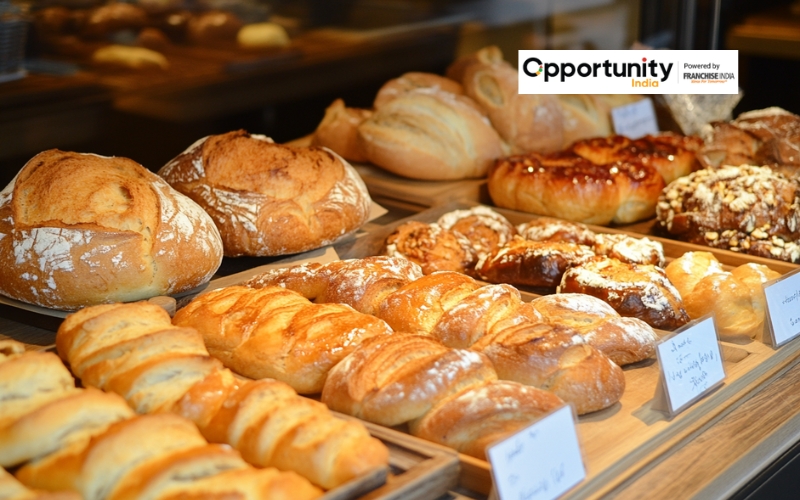
Imagine being surrounded by the aroma of baked cookies and bread. We all know that freshly baked cake, bread, and cookies are just irresistible. In India, the bakery industry is one of those feel-good endeavors with significant economic possibilities in addition to satisfying people's desires. Establishing a bakery might be a wise—and delectable—business decision given India's love for sweets, desserts, and teatime snacks. Whether you're a home baker looking to expand or someone who wants to operate a trendy cafe serving croissants and cupcakes, this guide will help you get your bakery up and running
The Indian Bakery Landscape: A Market Overview and Trends
Rising demand for fresh, artisanal, ready-to-eat baked goods, urbanization, and shifting customer tastes are all contributing to India's bakery industry's delightful rise. A bakery may be both a passion project and a very successful business, offering anything from delicious breads and pastries to specially made cakes for any occasion. Whether you're a home baker trying to expand or a food entrepreneur searching for your next project, the Indian bakery industry has a lot of promise—if done correctly.
Also Read: Established vs. Emerging Franchises: What's Right for You?
The size of the Indian bakery market in 2024 was $13.8 billion. According to IMARC Group's forecast, the market would increase at a compound annual growth rate (CAGR) of 9.12% from 2025 to 2033, reaching USD 31.5 billion. The market is expanding due to the growing population and shifting consumer preferences brought about by Western cuisine trends, rising cake and RTE food consumption, and the growing retail and e-commerce industries.
A genuinely wonderful opportunity exists in the Indian bakery industry for those who have a talent for business and a passion for pastry. Success, like any endeavor, depends on careful preparation, calculated execution, and in-depth understanding of the market. It's important to understand the Indian bakery market's pace before getting into the specifics. Several changes are influencing customer choices and creating new opportunities:
- Wellness and Health: There is a noticeable trend toward better choices. Customers are actively looking for items that are low in sugar, gluten-free, or high in protein, as well as those made with whole grains, millets, and natural sweeteners like dates, stevia, and jaggery. The growing popularity of the "No Maida Movement" suggests a desire for healthier substitutes.
- Convenience and Mobility: Single-serve, portable, and ready-to-eat bakery items are in high demand due to hectic urban lifestyles. Mini cakes, snack bars, and even do-it-yourself baking kits are available for the expanding market of home bakers.
- Artisanal and Specialty Products: Crafted, artisanal breads (sourdough, baguettes, focaccia), gourmet cakes, and distinctive pastries are becoming increasingly popular. Specialty bakeries that cater to specialized markets such as vegan, organic, or personalized goods are growing in popularity.
- Global and Fusion Flavors: Indian consumers are getting more daring and are enjoying both creative fusion dishes that combine international methods with traditional Indian ingredients, as well as international flavors like matcha, taro, and sea salt coffee.
- Gifting and Customization: Cakes and cookies, in particular, are growing into ever more popular gift options, especially when they come in distinctive flavors and high-end packaging for special occasions.
- Sustainability: Getting local ingredients, cutting down on food waste, and using eco-friendly packaging are all factors that businesses and customers are starting to take into account.
- Online Delivery and E-commerce: The bread industry has been greatly impacted by the digital revolution. Reaching a larger audience requires using online ordering and delivery services like Swiggy and Zomato, and cloud kitchens are becoming a more affordable option for businesses that prioritize delivery.

Types of Bakery Businesses You Can Start
A bakery is not a one-size-fits-all business. You can select from a variety of bakery business models based on your goals, target market, available space, and budget. Choose the kind of bakery you want to start before you start setting up. Every model has distinct operational and financial requirements:
- Home Bakery: An inexpensive business model that's perfect for beginners. You run the bakery out of a tiny area of your house or your kitchen. You are in charge of baking, packing, and occasionally even delivering. It’s ideal for low-budget startups, enthusiastic home bakers, and first-time business owners.
- Retail Bakery Shop: A walk-in establishment that offers takeout or dining options. A physical bakery where customers can enter, browse, and purchase baked goods. Additionally, some might provide seating for quick bites. It’s best for skilled bakers, those with bigger budgets, and places with plenty of foot traffic.
- Online Bakery: You can take orders through applications, websites, or aggregators like Swiggy and Zomato. A fully digital business strategy in which clients place orders via meal delivery apps, WhatsApp, social media, or your website. It’s perfect for cloud kitchen operators, independent business owners, and tech-savvy bakers.
- Cloud Kitchen Bakery: It is a delivery-only business without a physical location. You may need a dedicated professional cooking area for completing online orders. There is only a backend setup for baking and dispatching; there is no dine-in or walk-in area. It’s best for entrepreneurs seeking size and volume sales who have a respectable amount of funding.
Also Read: How to Start an Embroidery Business in India?
Key Steps to Starting Your Bakery Business in India
Starting your own bakery demands a methodical strategy. The following are the necessary steps:
Conduct Some Market Research
A fancy MBA is not necessary; just basic local knowledge would do. Consider this:
- What are those around me purchasing? Bread, cakes, or cookies?
- Are there well-known bakeries in the area already?
- What gaps—eggless options—can I fill? Delivery to your home? Products with a health focus?
- What range of prices is appropriate in my area?
Who are you attempting to reach out to? Families searching for regular bread, health-conscious millennials, or business clients in need of personalized cakes? It's critical to understand their purchasing patterns, tastes, and demographics.
Create a Simple Business Plan
You don't require a 100-page document, so don't worry. However, write down stuff like:
- Which goods are you going to sell?
- Who are your clients?
- How much capital is required to get started?
- How are you going to advertise your bakery?
Compare your monthly expenses to your anticipated revenue. This strategy will help you stay on track, and should you ever need finance.
Get the Right Licenses
Yes, paperwork is a bit boring, but it’s important. You’ll need:
- FSSAI License – This is a must for any food business.
- GST Registration – If your turnover crosses ₹20 lakh a year.
- Shops and Establishment License – For retail outlets.
- Company Registration – Can be sole proprietorship or Pvt Ltd.
- Fire and Safety Clearance – Especially if you run a café or retail store.
Also Read: Is Summer the Right Time to Invest in a Franchise?
Prepare Your Kitchen
The exciting part is about to begin: assembling your baking station! The following will depend on your model:
Basic equipment:
- Oven (commercial if you're scaling)
- Blenders and mixers
- Molds, baking trays, and tins
- Freezer and refrigerator
- Tools for measuring
- Materials for packaging
Finalize Your Menu
It's your moment to shine now! Instead of trying to do everything, decide what you want to provide.
Start with 10 to 15 good things that you can do well. Several well-liked choices are:
- Muffins and cupcakes
- Custom or designer cakes
- Brownies and cookies
- Buns with bread
- Savory snacks like puffs or sandwiches
Later, include festive products and seasonal promotions. Additionally, be sure that your rates include both profit and costs!
Also Read: Honey Bee Farming Business Plan in India
Hire Staff
If you're expanding your business beyond baking at home, think about hiring:
- Bakers or assistants
- Front desk staff (for stores)
- Delivery partners (or partnerships with Zomato and Swiggy)
They must receive consistent and hygienic training. Make sure everything always looks and tastes well because one negative review can damage your reputation.
Focus on Branding & Marketing
Baking delicious food isn't enough in today's society; you also need people to notice and want it.
Here are some tips for advertising your bakery:
- Create an Instagram page and share mouthwatering images.
- Send out broadcast messages on WhatsApp for frequent deals.
- Create a Google My Business listing for your bakery.
- Join forces with delivery services like Swiggy or Zomato
- Provide gift alternatives, party boxes, and festival hampers.
- Distribute tiny, complimentary samples at launch.

How Much Does It Cost to Start a Bakery in India?
Here’s a simple breakdown depending on your model:
| Expense | Home Bakery | Retail Store Bakery |
|---|---|---|
| Equipment | ₹1–2 lakh | ₹3–5 lakh |
| Kitchen Setup | ₹50,000 | ₹2–3 lakh |
| Licenses & Registrations | ₹10,000 | ₹30,000–₹50,000 |
| Interiors (if store) | – | ₹1–3 lakh |
| Raw Materials (stock) | ₹25,000–₹50,000 | ₹50,000–₹1 lakh |
| Branding & Marketing | ₹10,000–₹20,000 | ₹30,000–₹70,000 |
| Total | ₹2–3.5 lakh | ₹7–12 lakh |
Building a brand, fostering happy moments, and managing a savvy business are more important than simply baking cakes when starting a bakery in India. The chance exists whether you're starting a full-fledged business or baking from your kitchen. The smell of freshly baked bread is the epitome of success, so throw on your apron, light up the oven, and pursue your passion.

